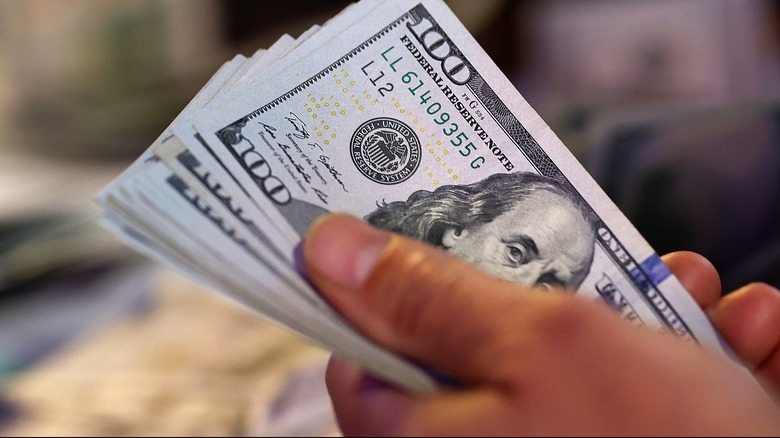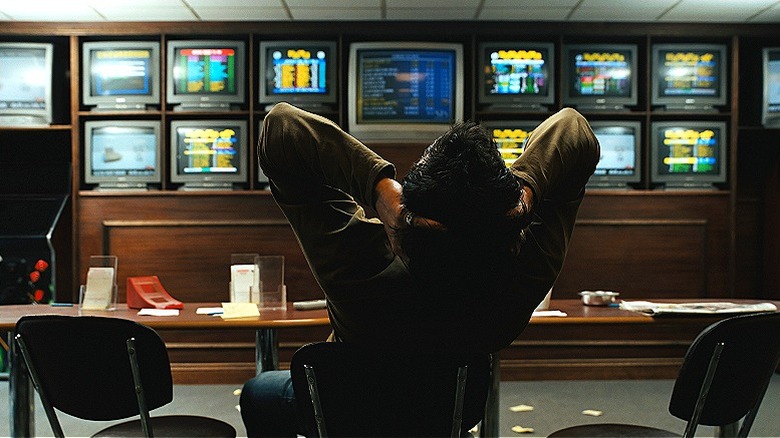This Stat About Gambling Vs. Stocks Has Us Concerned For America's Future
There's an active debate in America right now about the wisdom of legalizing sports gambling. A 2018 Supreme Court ruling paved the way for states to allow sports betting, and in a few short years, the number of states with such legalized gambling has gone from two to 38. A sizable majority of Americans favor allowing sports betting. It's been turned into a major source of revenue for states through taxes, and betting has been thoroughly integrated into sports broadcasting as well.
However, there's a darker side to enabling widespread gambling. Within sports themselves, some athletes have started to run afoul of organizational gambling policies. More serious, though, is the rise in reports of problem betting and outright addiction. Particularly in low-income communities, evidence suggests a massive spike in bankruptcies and debt delinquency, and relatively small but alarming rises in domestic violence.
Legalized sports betting has also affected how Americans invest. The Atlantic reported that every dollar spent on sports gambling meant two dollars less invested. And in 2024, a study was published, "Gambling Away Stability: Sports Betting's Impact on Vulnerable Households" (via Bloomberg) that found money that might have gone into the stock market was being blown in sports betting.
Sports gambling offers comparable highs to stock trading
"Gambling Away Stability" has not yet been peer-reviewed, which has been a key argument against the paper by casinos and sports gambling advocates. These same groups have challenged the idea that betting and stock trading should be compared at all. The former, they argue, is an exercise in entertainment. Stock trading is a more serious financial matter. And advocates say that people keep their entertainment money and their investment money separate.
But while investing, per se, may not be a close match for gambling, trading stocks can certainly become an addictive, as well as destructive financial habit the same way uncontrolled gambling can. Particularly in the way that trading and gambling are set up online, both provide a short-term rush through platforms that have been accused of baiting people into irresponsible indulgence. Given the choice between the two, Bloomberg advised that stock trading would be the lesser of two evils compared to losing money — potentially a lot of money — on bets.
The options for tamping down sports betting are difficult
Because states legalized sports betting at different times following the 2018 Supreme Court ruling, it's relatively easy to observe its effects over the years. One finding from "Gambling Away Stability" was that sports betting acted as a gateway bet to other forms of gambling. The rate of card games went up, as did the rate of ancillary activities to betting, meaning even more money that isn't going into investments.
The authors of "Gambling Away Stability" argued that their paper's findings, and the toll gambling addiction can have on American families, should encourage strong regulation of the industry. Bills to that end have been introduced in the U.S. House of Representatives, though gambling advocates and operators are unsurprisingly opposed. However, regulation for such activities is difficult to draft with precision, and it doesn't always account for the influence of industry on regulatory bodies. That's why some, such as the Atlantic's Charles Fain Lehman, have advocated returning to a general prohibition on sports gambling.
If you or anyone you know is struggling with problem gambling, help is available. The National Problem Gambling Helpline (1-800-GAMBLER) is available 24 hours a day. The National Council on Problem Gambling offers call, text, and chat services for those in need.


